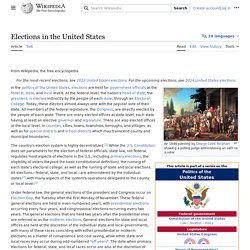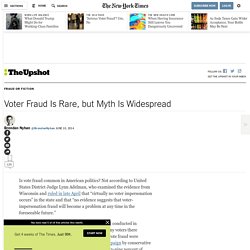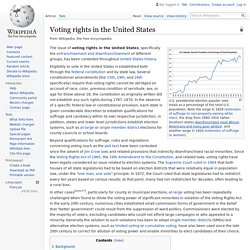

2016 POTUS Election. State Politics - Ballotpedia. Elections in the United States - Wikipedia. Political elections for public offices in the United States While the United States Constitution does set parameters for the election of federal officials, state law, not federal, regulates most aspects of elections in the U.S., including primaries, the eligibility of voters (beyond the basic constitutional definition), the running of each state's electoral college, as well as the running of state and local elections.

All elections—federal, state, and local—are administered by the individual states.[2] HeadCount. Voted Fraud Myth. Is vote fraud common in American politics?

Not according to United States District Judge Lynn Adelman, who examined the evidence from Wisconsin and ruled in late April that “virtually no voter impersonation occurs” in the state and that “no evidence suggests that voter-impersonation fraud will become a problem at any time in the foreseeable future.” Strikingly, however, a Marquette Law School poll conducted in Wisconsin just a few weeks later showed that many voters there believed voter impersonation and other kinds of vote fraud were widespread — the likely result of a yearslong campaign by conservative groups to raise concerns about the practice. Voter Turnout - United States Elections Project. Voting in Person on Election Day. Voting rights in the United States. The issue of voting rights in the United States, specifically the enfranchisement and disenfranchisement of different groups, has been contested throughout United States history.

Eligibility to vote in the United States is established both through the federal constitution and by state law. Several constitutional amendments (the 15th, 19th, and 26th specifically) require that voting rights cannot be abridged on account of race, color, previous condition of servitude, sex, or age for those above 18; the constitution as originally written did not establish any such rights during 1787–1870. In the absence of a specific federal law or constitutional provision, each state is given considerable discretion to establish qualifications for suffrage and candidacy within its own respective jurisdiction; in addition, states and lower level jurisdictions establish election systems, such as at-large or single member district elections for county councils or school boards.
In other cases[which?]